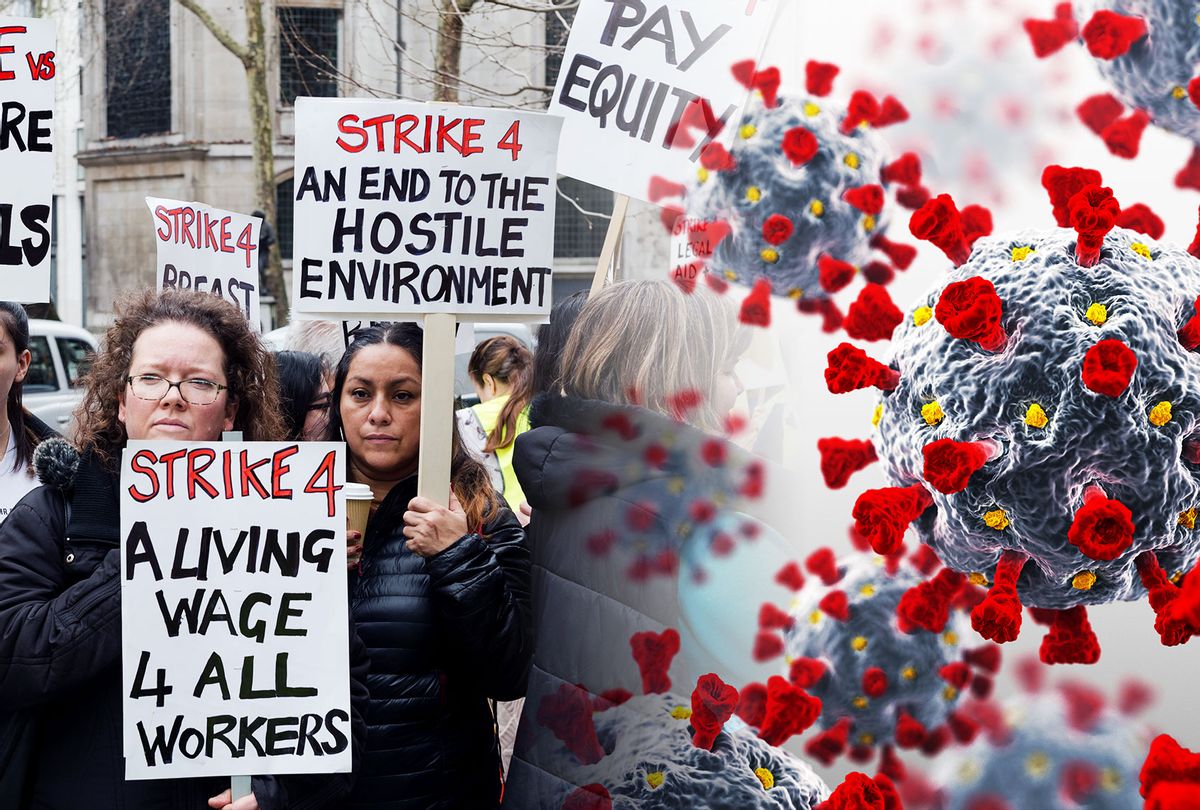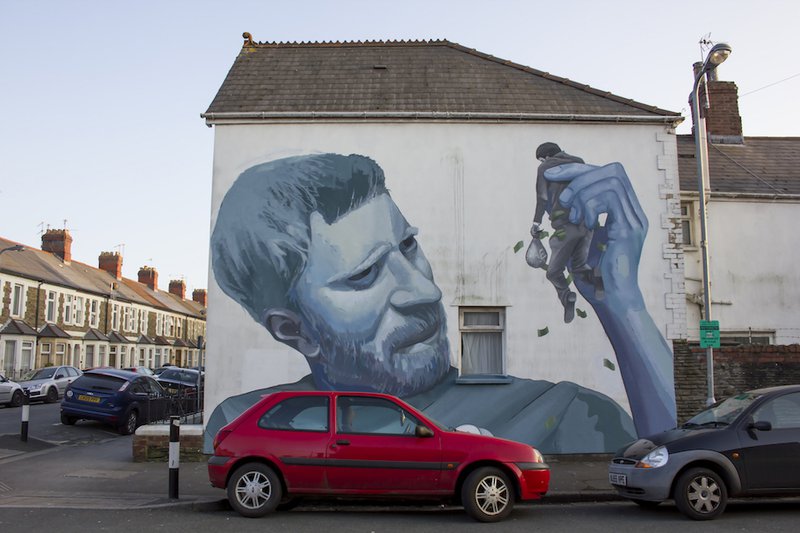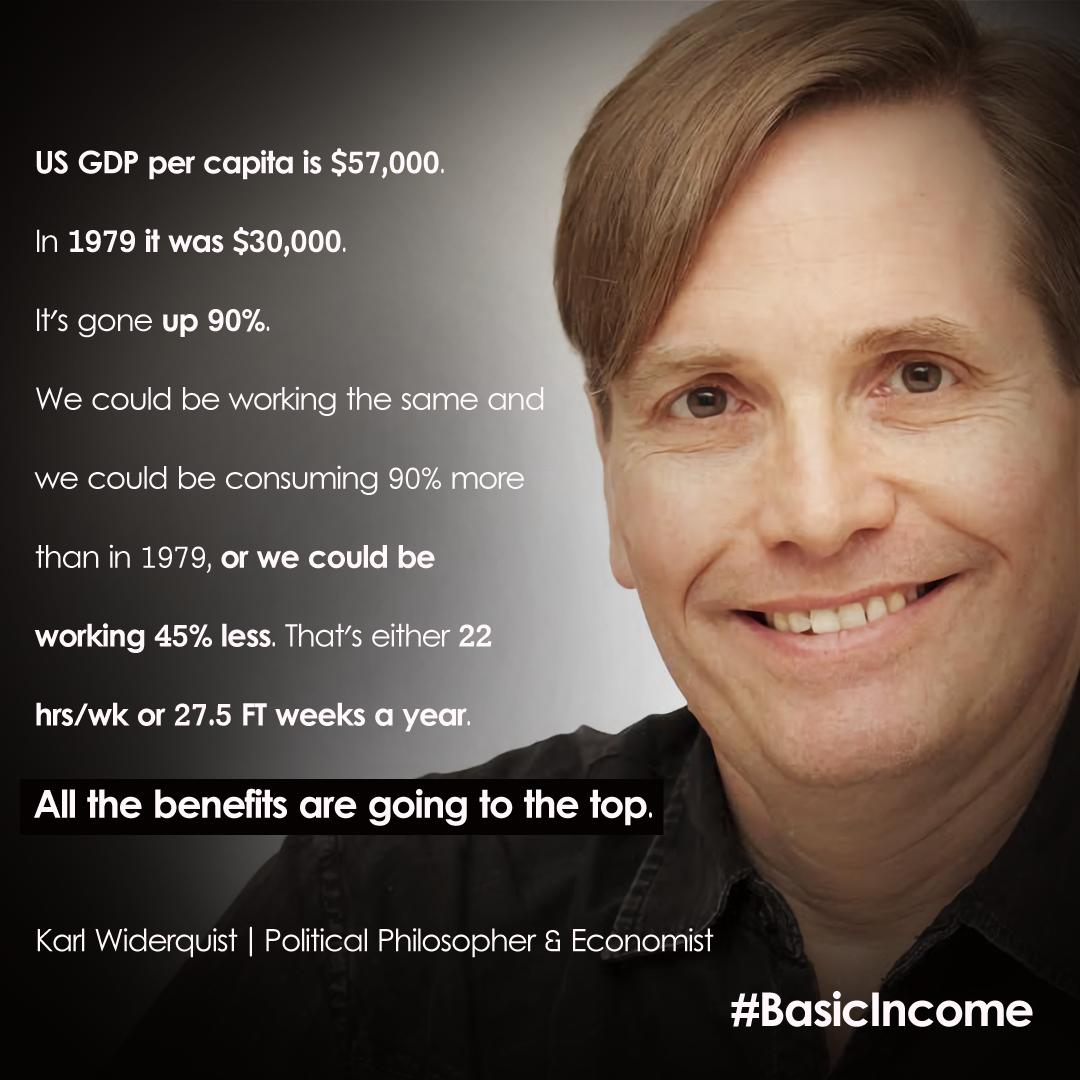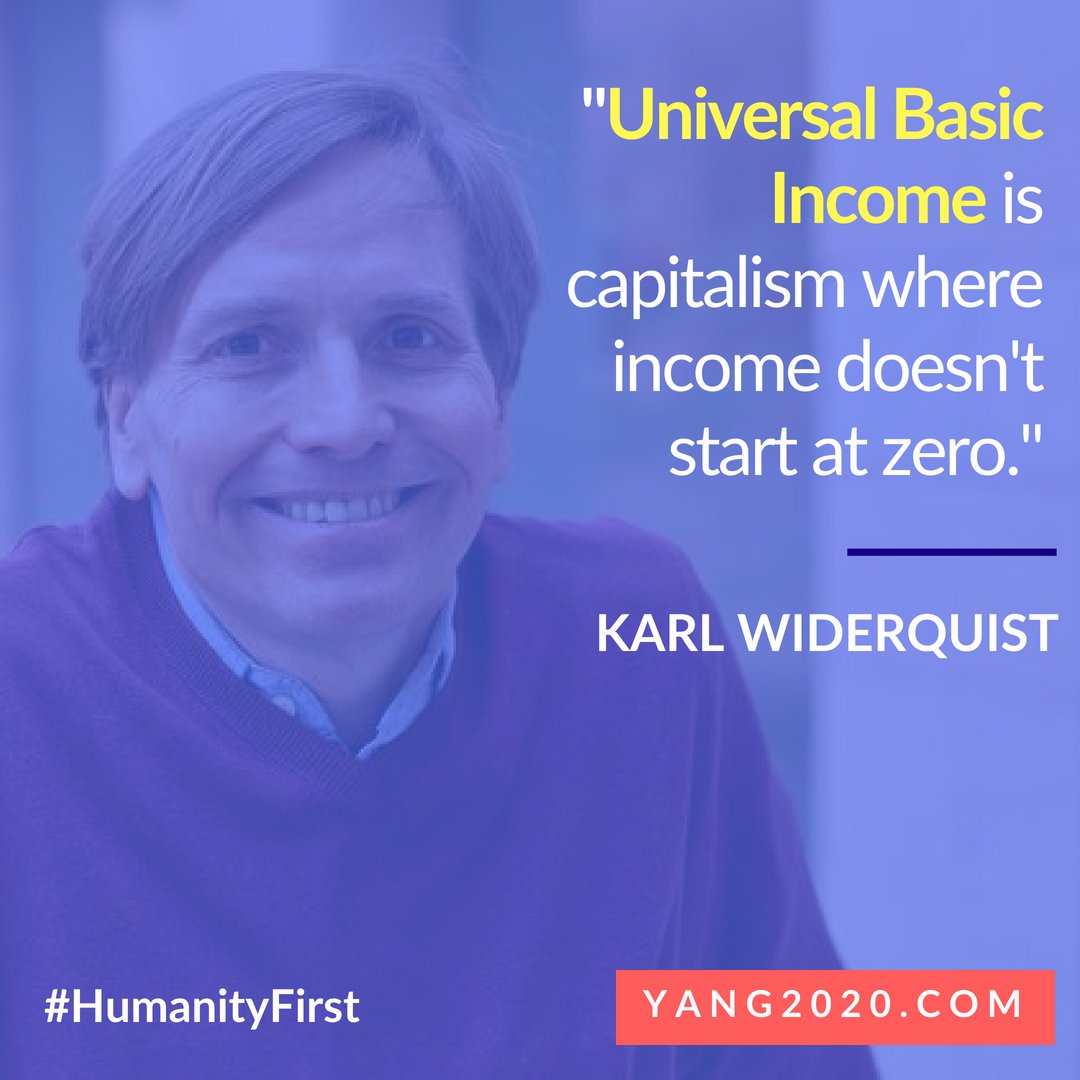
by Andrew Sanchez | Sep 14, 2018 | News
In her recent work Give People Money: How a Universal Basic Income Would End Poverty, Revolutionize Work, and Remake the World (W.H. Allen), Atlantic writer Annie Lowrey offers a new account of the universal basic income (UBI) rooted in her experience as a global observer of geopolitics, economics, and social policy.
Lowrey approaches UBI as a potential tool to redress a variety of issues, including inequality, poverty, and technological unemployment, which have become increasingly divisive in the aftermath of the 2008 financial crisis and the recent boom in AI research. By viewing human action rather than impartial circumstance as the primary driver of socio-political change, Lowrey concludes that UBI represents an “ethos” of universality, unconditionality, and inclusion as much as any concrete policy proposal.
In the opening chapter, Lowrey explores the relationship between basic income, work, and technological unemployment. After sketching the twinned histories of human advancement and the fear of technological unemployment, she examines why current innovations in AI might be qualitatively different from earlier achievements and why these differences may in fact lead to widespread joblessness. Lowrey notes that certain Silicon Valley luminaries, whose own endeavours threaten the livelihood of many low-skilled workers, have promoted the UBI as a necessary social policy for a jobless future.
Despite calls by technologists for a UBI as a “social vaccine for the 21st Century,” Lowrey ultimately considers discussion of basic income in relation to future joblessness as premature. Although she grants that basic income could operate as an important vehicle of state provision in the future, Lowrey prefers to consider the UBI’s potential to address current social and economic problems.
These problems range from a labour market with stagnant wage growth in Houston to chronic poverty on the shores of Lake Victoria to the challenges of welfare reform in rural India. In each case, Lowrey unpacks how political choices, bureaucratic structures, and personal circumstance converge to prevent certain people from meeting their basic needs.
Through carefully examining different political, geographic, and economic contexts, Lowrey can assess the benefits and drawbacks of basic income proposals in a variety of contemporary settings. This approach accepts that any form of UBI would affect different communities and individuals in unique and perhaps unpredictable ways.
Give People Money distinguishes itself from other works on the topic through its commitment to personal narrative and Lowrey’s own experience with the people who stand to benefit from basic income proposals. Although she examines the ethical and economic justifications of UBI, her primary focus lies in the human story and the way she came to view UBI as an ethos of transformative social change. Give People Money ultimately advocates for UBI not by advancing specific policy initiatives, but by presenting basic income as an impetus to radically reconsider what humans owe one another and how the earth’s bounty ought to be shared.

by Andre Coelho | Jul 7, 2018 | News
Muhammad Yunus. Picture credit to: Yunus negócios sociais (Brazil)
Muhammad Yunus, the 2006 Peace Nobel Prize laureate and founder of the Grameen Bank, is very concerned about artificial intelligence (AI). His fear revolves around the prospects of generalized unemployment, as machines replace most of traditionally human tasks.
Yunus also, like a few other economists, including Nobel Prize winners, has reached the conclusion that one of the downsides of AI is the devaluation of the human being, in relation to machines. This, he argues, will take away the ability of many people, even more than today, to care for their own basic needs. Hence, Yunus concludes, a universal basic income must be implemented now, before artificially intelligent algorithms start treating human beings as if they were “cockroaches”.
He also calls for legislation which can circumscribe AI’s intervention in society, recalling that guidelines exist for many other aspects of our reality, such as medicine, food, engineering, and so on. That would not be a deterrent to the development of novel AI applications, but only the introduction of safety mechanisms that would prevent AI creations from killing people, or making decisions for them abusively, for instance. If humans have created these technologies, then humans can, and should, direct them to socially positive goals, such as healthcare.
According to Muhammad Yunus, basic income will be an important means to bring out the natural entrepreneur in every human being. Humans can and will do many things, given the right conditions. Yunus is convinced, and his Grameen Bank stands out as proof, that people need not be “mercenaries of the whole system”, and that schools should create “life ready” young people, rather than “job ready” ones.
More information at:
Sangeetha Chengappa, “It is time to introduce Universal Basic Income, says Nobel Peace laureate Muhammad Yunu”, The Hindu Business Line, July 2nd 2018
Kate McFarland, “SCOTLAND, UK: Nobel-winning economist Joseph Stiglitz cautions again Basic Income during BBC interview”, Basic Income News, November 8th 2017
Kate McFarland, “Nobel Laureate Economist Augus Deaton endorses basic income”, Basic Income News, May 18th 2016

by Kate McFarland | Jun 23, 2018 | News
What’s the Buzz from Rheinau?
Earlier in the month, headlines made such proclamations as “Swiss municipality to offer guaranteed income” (SWI), “Swiss village considers a crowdfunded basic income for all inhabitants” (Toronto Star), and “Swiss town set for universal basic income experiment” (The Local Switzerland), referring to Rheinau, a town of about 1300 people in the north of the country.
To preclude misunderstanding about what is happening in Rheinau, it should be stressed that the village is not enacting a basic income, nor is its government deliberating an implementation of the policy, nor is it running a state-sponsored trial. Moreover, to avoid possible confusion, it is specifically worth noting that this latest news from Rheinau is unrelated to previously reported discussions of basic income pilots by Swiss political bodies, such as the investigation of municipal basic income pilots initiated last year in nearby Zurich.
Instead, the news is this: the city council has agreed to permit an independent filmmaker Rebecca Panian to make the village the site of privately funded one-year trial of a program similar to basic income, involving at least half of the town’s population, which would serve as the basis for a documentary. The project’s main purpose is to provoke interest, discussion, and further research into the idea of basic income.
While the village’s council has given the green light to the documentary project, the ultimate execution of the project remains contingent on enrolling the desired number of participants and raising sufficient funds. Moreover, the design and duration of the trial remains liable to change during the course of discussion with the local council and inhabitants of Rheinau.
The Payment Scheme: Unconditional, Subject to Repayment
If the trial does come to fruition as currently planned, it will not, strictly speaking, test a basic income: participants in the trial over the age of 25 will be given a cash payment of 2500 Swiss francs (CHF) (about 2151 EUR) at the start of each month, with reduced amounts given to minors and young adults, irrespective of income, household status, work, or need; however, if participants receive additional income during the month, they will be expected to repay this money in part or full.
Stated otherwise, participants over age 25 will be granted 2500 CHF at the start of each month, but will be permitted to keep only as much as necessary to ensure that their total income for the month is at least 2500 CHF (with lower amounts for younger age groups). If they earn above 2500 CHF, they will repay the entire amount of the grant.
To many, this feature of the design might cause the project to seem not a test of basic income at all; after all, according to the Basic Income Earth Network, a basic income is by definition delivered without means test. For the project’s initiators, however, the repayment requirement is a way to attempt to more accurately simulate what a basic income would feel like if actually implemented in Switzerland, where many individuals, earning high salaries, would presumably “repay” any amount paid out as a basic income in personal income taxes. “[It] is important to us not to spread the illusion that an unconditional basic income simply means more money in your pocket,” Panian tell Basic Income News, “It just means that the basic income is unconditional. Everybody gets it so nobody needs to fear angst (existenzangst) again.”
Since the cash allowance is paid upfront, the plan is distinct from a negative income tax or top-up scheme in which individuals are “reimbursed” if there earned income falls below a certain threshold. One might say it loosely resembles a basic income accompanied by an increase in individual income tax.
That being said, this provisional design has not been set in stone, and documentary team will consult with residents of Rheinau later in the year to produce a finalized design.
Motivation: “Too Many Questions Unanswered”
Like many in both Switzerland and abroad, Panian first heard about basic income when a referendum to enact the policy was put on the ballot in the 2016 Swiss general elections. Although the referendum left open the amount of the basic income — it stated only, “Legislation will determine the funding for the system and the actual amount of the basic income” — a monthly payment of 2500 CHF was often discussed during the campaign.

Celebrating 23% Yes referendum vote, CC BY 2.0 Generation Grundeinkommen
Panian was intrigued by the idea as a possible solution for challenges posed by the future of work. In her view, a society based on the goal of full employment is unsustainable in the face of accelerating automation, and attempting to maintain such a system will result in “mass unemployment and lots of people with no money, no support, and no perspective.”
At the same time, she was not surprised that the referendum failed at the ballot box, telling Basic Income News, “there were too many questions unanswered, and in the mind of many people this idea remained a crazy, non-realistic vision.”
Panian herself does not express certainty that basic income is the new system needed by Switzerland and other nations facing the threat of automation, but she believes that “we better test it as well as we can before we throw it in the bin and do nothing.”
This goal — opening people to the idea of basic income as a serious proposal — provided the motivation that would ultimately lead the filmmaker to Rheinau: “I figured out that in order to become more open to the idea, people need more time, and they need to ‘see’ it happening. That’s how I came up with the idea to start a test it in a village. … Everybody who watches the experiment going on in a village can sympathize with the villagers and with that get more connected with the idea.”
The Village: A “Mini-Switzerland”
Other privately financed and administered “basic income” projects, including Germany’s lottery-style Mein Grundeinkommen and the in-progress US documentary Bootstraps, have focused on individual-level effects of unconditional monthly cash grants.
Like the directors of Bootstraps, Panian hopes to document the lives of individual participants in the Rheinau project. But Panian is also interested in the community-level impact of a basic income, and for this reason decided to situation her study in small village in which the majority of residents would be able to take part.

Rheinau Abbey, CC BY SA 3.0 Hansueli Krapf
Panian first announced her plans in January of this year, putting forth a call for Swiss municipalities to serve as the site of the documentary. In some cases, city councils placed bids to be the site of the basic income test. In others, individual residents wrote to Panian to nominate their own communities.
Panian ultimately selected Rheinau out of more than 100 applicants, in part on the basis that its demographic structure reflects Switzerland as whole. As she describes it to Basic Income News, the community is “small but like a mini-country.”
According to Panian, Rheinau was also a favorite due “fantastic communication with the local council” and the council’s “real interest in the experiment.” Neue Zürcher Zeitung reports that the village rejected the country’s basic income referendum with 72% no vote in July 2016, but that its mayor and councilors have been receptive to involving the community in a small-scale test of a similar program. In a statement quoted on the official website of the planned documentary, the council declares that basic income “deserves to be tested” and “encourage[s] the population to participate” in the trial and film project.
The Research Team
In addition to Panian, a team of social scientists — including an economist (Jens Martignoni), organizational psychologist (Theo Wehner), linguist (Aleksandra Gnach), and sociologist (Sascha Liebermann) — is fronting the basic income project in Rheinau.
The four scientists are currently designing a study about of the effects of the program on the community. However, as Martignoni stressed in correspondence with Basic Income News, the research project is in an early stage of development, and it is too early to tell what can be learned from the trial.
In addition to assessing the effects of the program on the well-being of participants and the community, the researchers hope to examine its effects on their opinions on basic income itself. Liebermann tells Basic Income News, “I am curious to find out how the people in Rheinau think about the basic income and how their thinking about it might change during the trial and in what direction,” which he plans to investigate through in-depth interviews.
Like Panian, both Martignoni and Liebermann emphasize that cooperation with the local community is an important aspect of the Rheinau experiment, in contrast to other past and ongoing trials of basic income and negative income tax, with the people of Rheinau to themselves be included in the development of a final model. The researchers also emphasize that the Rheinau project is unique in that its goal is not to fight unemployment or poverty.
Basic Income in a “Rich Country”
In regions where governments are currently sponsoring or overseeing trials of basic income or other income guarantees — including Finland, the Netherlands, Ontario, Barcelona, and Stockton — the main objective is to address unemployment or poverty.

Generation Grundeinkommen demonstration, CC BY-NC 2.0
While Switzerland is not without poverty, it is known as a relatively wealthy nation. The median salary was reported in 2015 as 6189 CHF per month, and the average household income was reported in 2017 at 6957 CHF per month. According to the Federal Statistical Office, only 10% of people living in Switzerland have a monthly disposable income below 2243 CHF — suggesting that relatively few might stand to benefit from a monthly 2500 CHF grant subject to repayment.
Panian herself believes that, for this reason, a Swiss experiment would have the potential shed a fresh perspective on the basic income debate, “Switzerland is famous as a ‘rich’ country. If we test it, we don’t do it primarily to fight unemployment or poverty.” Martignoni also points out that the trial planned in Rheinau would be unique among basic income experiments as one that is “not restricted to a poor part of the population but to all in a developed (‘rich’) country.”
That said, if the filmmaker believes that main reason to implement basic income in rich nation like Switzerland would be as a sort of insurance against future automation and digitization, then one might wonder what impact she hopes or expects to observe during a one-year trial in 2019. Indeed, if it most Swiss workers are already earning well above 2500 CHF per month, one might wonder if the trial will have any effect on participants (except, perhaps, the minor inconvenience of the required monthly repayments). Asked about this concern, Panian noted that, while very few Swiss men have monthly salaries below 2500 CHF, a significant proportion of women still lack their own income. Since the benefit will be paid on individual rather than household basis, women without a personal income will be able to keep the entire monthly payment. Thus, Panian predicts that families with children and stay-at-home mothers will be prime beneficiaries.
She adds, however, that individual monetary benefits are not, in her view, the only “benefit” of basic income: “I talked to many people, and it became obvious that most of them only think about how they could or would not profit on a monetary basis from the basic income. What they seem to forget is that if you live in a society where people don’t have to fear for their basic needs, they might get more content, and this will have a positive effect on the whole community.”
In any case, the discussion of potential benefits to Rheinau itself should not obscure the fact that, for the team behind the trial, the major goal is not to produce measurable results but to reinvigorate discussion of basic income in Switzerland and beyond. According to Panian, the best case scenario is one which the project “inspires others to organize more experiments on their own in their communities and motivates people to think about what future they want.”
Enno Schmidt, the filmmaker behind an earlier basic income documentary and cofounder of the referendum campaign, agrees that the greatest promise of the project is to catalyze further discussion: “it is one first fresh new activity after the referendum; it keeps the topic in Switzerland a little awake. It encourages other communities to think about whether or not they will also introduce a basic income on a trial basis.”
For more information and updates on the Rheinau basic income project, see https://www.dorf-testet-zukunft.ch/page1.html.
* * *
Article reviewed by Patrick Hoare.
Cover image: Rheinau, CC BY-NC 2.0 Wisi Greter

by Michael Lewis | May 18, 2018 | Opinion
Facebook and Economic Security Project (ESP) co-founder, Chris Hughes has a new book out. Called Fair Shot: Rethinking Inequality and How We Earn, the book is part memoir, part policy proposal. The memoir chronicles Hughes’ childhood growing up in a North Carolina working class family, his school days, including four years at Harvard, his co-founding of Facebook, his failure as owner of the New Republic, and his efforts trying to figure out how best to give away his new-found fortune. The things Hughes learned during this thirty-year journey led to the policy proposal part of the book.
Hughes advocates what he calls a guaranteed income (GI) and is clear about how his proposal differs from a universal basic income (UBI). A UBI would periodically provide everyone with a certain amount of money without any means-test or work requirement. Hughes’ guaranteed income proposal has two provisions which distinguish it from a UBI: it is means-tested and it does have a work requirement. His idea is that we should provide every adult living in a household with an income of less than $50,000 a year a guaranteed income of $500 per month. So if Tara and Willow were a couple with a household income of $45,000 per year, each would each receive $500 per month. Thus, each would end up with $6,000 per year or $12,000 per year for the two of them. If Buffy and Angel had a household income of $60,000 per year, they would be ineligible for the program.
One reason Hughes is so interested in distinguishing his proposal from UBI is that he believes UBI has become too associated with automation. That is, the most frequently heard argument for UBI is that as robots and automation destroy jobs, we will need to reorganize society so people will be able to get their needs meet without having to sell their labor. Hughes rightly points out that there is a fair degree of debate about the extent to which jobs will be destroyed and, therefore, the extent to which concern about automation is a compelling enough reason to advocate UBI. Hughes also rightly reminds us that whether or not automation will destroy all, most, or whatever number of jobs; the job market is already unstable enough for there to be a need now for a policy that promotes economic security. And he believes his GI proposal is that policy.
As an “old timer” in the basic income “movement” I feel obligated to point out that UBI was discussed long before folks in Silicon Valley were paying attention. And many of those discussions had little to do with robots or automation. Thus a name change, from UBI to GI, is not necessary to suggest there may be reasons to support UBI other than worries about robots taking our jobs. But here we get to the crux of the matter: Hughes’ proposal does not appear to be just a name change but a different policy altogether. As I said above, GI would not be universal and would not be granted to those who are not working. The means–tested nature of GI is clear: those in households with incomes under $50,000 per year would get it, while those in households with higher incomes would not. I’m not a fan of this aspect of Hughes’ proposal, but, for the purposes of this essay, I’m going to set this aside. The work conditioned nature of Hughes’ proposal is less clear. This is what I want to focus on in the rest of the essay.
Even though Hughes’ GI would require people to work in order to receive it, however it does not have to be wage-work. That is, Hughes is willing to expand the definition of “work” to include care work, such as uncompensated child and elder care, as well as studying for a formal degree or training programs. So someone caring for their child or studying for a B.A. would be considered a worker and, therefore, eligible for the benefit, as long as their income was under $50,000 per year.
Hughes places such emphasis on work because he believes it is good for us; he tells us that it makes us, “happier, healthier, and more fulfilled” (p. 103).
As I was reading this discussion of the problems faced by the unemployed, I found myself wondering how much stem from an inability to find something fulfilling to do and how much from stigma. I do not think it is unfair to say that our society denigrates people whom we think can work but choose not to.
But let’s say Hughes is right and people do feel more fulfilled if they engage in wage work. Let’s say that engaging in wage work makes us less prone to depression, irritability, and insomnia. Going to college or caring for one’s kids is not wage work. So what do studies showing we are less prone to psychological and physical problems when we engage in wage work have to do with the kinds of non-wage work Hughes wants to compensate with his GI? I suspect it’s fulfilling, at least some of the time, to take care of one’s kids or to attend college. Is this why care takers and students, along with wage workers, should be compensated with a GI? But if something being fulfilling is sufficient to warrant compensation, why stop at wage work, care work, or going to school? People do all kinds of things, besides these three, they find fulfilling. Why not give them a GI too?
On page 92 of his book, Hughes says that, “everyone who contributes to their community” should receive a GI. It seems that engaging in something fulfilling is not what warrants receipt of a GI — making some social contribution does. This raises the question of whether being a wage worker, care taker, or student are the only ways to contribute to one’s community. Hughes’ answer seems to be “no.” On page 112, he argues for a more expansive definition of “work” which would include not just wage work, care work, and studying but also community service, religious service, and artistic work.
Here I found myself wondering how far Hughes is willing to go. That is, how expansive a definition of “work” does he want? The more expansive his definition becomes, the more fuzzy the distinction between GI and UBI (the unconditional part) becomes. To see what I’m getting at consider the following example.
In downtown Manhattan, there’s a famous, at least among many basketball lovers, outdoor basketball court on 4th Street and 6th Avenue. Basketball, in a sense, is a very communal game. A person may shoot jump shots all by themselves. But to play a full-court pick-up game requires ten people. So if someone decides to play, even for the “selfish” reason that they get fulfillment from it, they benefit the other nine players as well, simply by making the game possible. Now the folks who play at this Manhattan court are quite good. Many of us who’ve seen games at this court think it’s some of the best pick-up basketball we have ever witnessed. In fact, the quality of games at this court is so high, that large crowds of people usually gather just to watch the action. Presumably, these spectators get a great deal of enjoyment from watching these folks try to get the “ball in the hole.” Now here’s the question: are the players at this court, simply by playing, making a social contribution? They are not doing wage work, care work, art work, or religious service. Are they doing community work? If Hughes’ GI were enacted and all these players were from households with incomes of less than $50,000 per year, should they receive it?
Another way to get at the question above is this: under an expanded definition of work what would not qualify as work? If it turned out that anything done during one’s waking hours was work, then the difference between GI and the unconditional part of UBI would simply be semantic. Hughes could respond that semantic distinctions are not “merely semantic.”
In a society where work is a fundamental value it may be necessary to call something work, as well as convince others that it is, in order to give the person engaged in that activity a guaranteed income. This is a response I would agree with. But I would add that the importance of semantics cuts both ways.
Requiring an activity to be considered work before the person engaged in it can receive income support is also sending the semantic, or symbolic, message that only working people deserve economic security. I can understand why we might want to do this in a hunter-gatherer society where all are living on the brink of starvation. But do we really need to in the richest society the world has even known? Consider something that may at first appear unrelated.
The U.S. currently imprisons about 1.5 million people. Anyone familiar with the U.S criminal justice system is aware that our prison population is, arguably, one of the most despised groups of people in the nation. Yet we grant all these prisoners a right to food. Prison life is no doubt hard. And we certainly do not feed incarcerated people the best food possible. But we do feed them, and I suspect anyone who proposed that we stop doing so would not get very far. Now here’s a question: is refusing to make a social contribution worse than the most serious violent crimes we have imprisoned some people for committing? If not, why propose a policy which sends the semantic message that non-working people do not deserve income support, income that could help them obtain food, as well as meet other basic needs? Why send a semantic message which implicitly amounts to the claim that non-working people are worse than some of our most violent prisoners?
To anticipate a possible misunderstanding, I am not claiming that non-working people are better than some of our most violent prisoners. My point is simply that if all prisoners have a right to subsistence, why not grant non-working people that same right? Prisoners, non-working people, and all the rest of us are human beings in need of food and other means of subsistence. A UBI, at the semantic level at which I am speaking, acknowledges this. Hughes’ GI proposal does not.
Thanks to Chris Hughes for his very helpful comments on this piece. Any mistakes or errors are, of course, my responsibility alone.
About the author:
Michael A. Lewis is a social worker and sociologist by training whose areas of interest are public policy and quantitative methods. He’s also a co-founder of USBIG and has written a number of articles, book chapters, and other pieces on the basic income, including the co-edited work The Ethics and Economics of the Basic Income Guarantee. Lewis is on the faculties of the Silberman School of Social Work at Hunter College and the Graduate and University Center of the City University of New York.













 CIRS,
CIRS, 




 “
“






